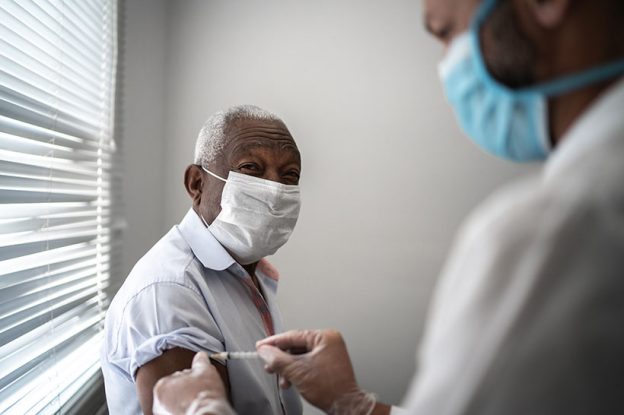
Original COVID-19 vaccine booster effect wanes against BA.4 and BA.5
A Kaiser Permanente study published January 12, 2023, in Nature Communications shows that third and fourth doses of the monovalent Moderna mRNA-1273 COVID-19 vaccine lose protection against infection with omicron subvariants after 3 months, but protection against hospitalization remains high in adults 18 years of age or older.
“This study provides important data on the effectiveness of the original monovalent Moderna mRNA-1273 COVID-19 vaccine against infection and hospitalization for omicron subvariants, including BA.4 and BA.5,” said the study’s lead author, Hung Fu Tseng, PhD, a senior scientist in the Department of Research & Evaluation and a professor at the Kaiser Permanente Bernard J. Tyson School of Medicine.
The study shows that protection for people who received 3 or 4 doses of monovalent Moderna mRNA-1273 COVID-19 vaccine against infection with omicron BA.4 and BA.5 lasted no more than 3 months after their third or fourth doses. The 3-dose and 4-dose vaccine effectiveness against hospitalization for BA.4 and BA.5 remained high, especially among people with compromised immune systems.
The study was completed before the new bivalent mRNA booster vaccine became available in September. mRNA vaccines use mRNA created in a laboratory to teach human cells how to make a protein—or even just a piece of a protein—that triggers an immune response inside human bodies. A monovalent vaccine contains an mRNA component from only one strain of virus; the monovalent COVID-19 vaccine, such as the Moderna mRNA-1273 COVID-19 vaccine, contains a component from the original strain of SARS-CoV-2. A bivalent vaccine, however, contains mRNA components from 2 strains of SARS-CoV-2, including the original strain and newer Omicron variant strains, BA.4 and BA.5.
Researchers from the Kaiser Permanente Southern California Department of Research & Evaluation conducted the study, which included 123,236 people ages 18 and older who tested for COVID-19 within Kaiser Permanente Southern California between January 1 and June 30, 2022. Among those, 30,809 tested positive and their specimens underwent whole genome sequencing to determine which strain of the virus each person was infected with.
Researchers found:
- While 3-dose vaccine effectiveness against BA.1 infection was high and waned slowly, it was initially moderate to high (ranging from 61.0% to 90.6% at 14 to 30 days after the third dose) against BA.2, BA.2.12.1, BA.4, and BA.5 infection, and waned more rapidly.
- The 4-dose vaccine effectiveness was moderate against infection with BA.2, BA.2.12.1, and BA.4 (ranging from 64.3% to 75.7%) and was low (30.8%) against BA.5 at 14 to 30 days after the fourth dose, disappearing beyond 90 days for all subvariants.
- While 3-dose vaccine effectiveness against hospitalization for BA.1 and BA.2 was high (97.5% and 82.0%, respectively), it was lower against BA.4/BA.5 (72.4%) with results that were imprecise due to small numbers.
- The 4-dose vaccine effectiveness against hospitalization for BA.4/BA.5 was 88.5% with results that were imprecise due to small numbers.
“As updated bivalent mRNA boosters are more widely used, continued evaluation of effectiveness, durability, and impact on SARS-CoV-2 evolution is necessary,” Dr. Tseng said.
In addition to Dr. Tseng, study authors included Bradley K. Ackerson, MD, Lina S. Sy, MPH, Julia E. Tubert, MPH, Gina S. Lee, MPH, Jennifer H. Ku, PhD, Ana Florea, PhD, Yi Luo, PhD, Sijia Qiu, MS, Soon Kyu Choi, MPH, Harpreet S. Takhar, MPH, Michael Aragones, MD, and senior author Lei Qian, PhD, of the Department of Research & Evaluation; Katia J. Bruxvoort, PhD, University of Alabama at Birmingham; and Yamuna D. Paila, PhD, Scott Chavers, PhD, and Carla A. Talarico, PhD, of Moderna.





